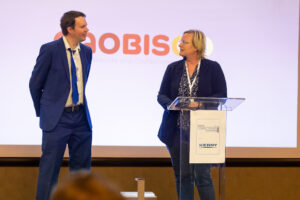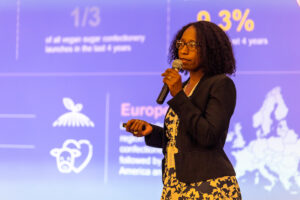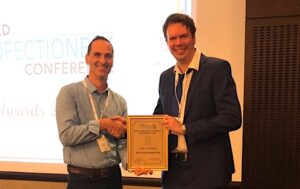World Confectionery Conference Brussels 2022: event review

Myrthe de Beukelaar, of Innova Market Insights, was among the speakers at the World Confectionery Conference in Brussels for our 2022 event. Pic: Cedric Puisney
This year’s World Confectionery Conference was successfully held in Brussels, Belgium, covering a broad spectrum of
key topics for our industries, as editor Neill Barston reports
n eclectic mix of speakers, exhibitors and major industry topics ensured our debut live World Confectionery Conference proved an engaging and entertaining event in Brussels. The showcase featured a truly international array of presentations, exhibitors and visitors, gathered at the city’s Marriott Hotel near the Grand Place, to hear key developments across equipment, systems, ingredients and finished product markets.
From speaking to a wide range of attendees, the chance to meet up once again in person was highly valued by those who ventured from across the globe to our event. This was reflected with our post-show survey, which showed some extremely positive feedback, with visitors praising its focus on sustainability in confectionery supply chains, as well as offering insightful trends presentations.
As a notable beginning, Aldo Cristiano, president of CAOBISCO, opened September’s event with a keynote presentation underlining the importance of supporting the sector and progressing major due diligence sustainability policies (see our exclusive video review of the conference here).
Speaking via an exclusively recorded address, he offered hope for the industry facing a significant raft of pressures including higher energy and ingredients prices, as well as ongoing logistics issues that have worsened with the war in Ukraine. However, the president of the organisation, who also serves as head of institutional affairs and sustainability at Ferrero in Germany, believed gains had been made by the sector against core issues including supporting cocoa communities.
He said: “Twelve months ago during the digital World Confectionery Conference, I mentioned that embracing sustainability had become a priority for our industry.
“As food producers, we heavily depend on the agricultural sector in Europe, in Africa, South America and Asia – and so many members have continued to engage in concrete actions on the ground for more sustainable supply chains such as cocoa, through private initiatives to empower cocoa farmers, while contributing to reaching decent living incomes, climate resilience and environmental and human rights protections,” explained the president, who said that positive changes were being seen.
He cited the establishment of the Cocoa and Forests Initiative over the past five years, which has centred on preventing deforestation as a dominant driver of industry engagement on supporting core communities, including major supplier nations in Ghana and Ivory Coast.

The two West African nations are responsible for sourcing around two thirds of cocoa supplies for the chocolate sector – though its farming communities still face considerable risks from poverty, and issues relating to child labour and deforestation. Cristiano continued: “CAOBISCO members have been taking very concrete steps through their own voluntary programmes, to mitigate and minimise risk of deforestation in supply chains.
Some also started robust due diligence systems to mitigate and prevent from possible risks on human rights and the environment. “We as CAOBISCO have also been fully engaged in dialogues in the upcoming EU legislations on deforestation free products, and on corporate sustainability due diligence – it’s a shared responsibility for all supply chain actors who must act collectively to achieve a sustainable food sector, from farm to fork,” adding that the organisation had made contributions to the European Union’s own code of conduct on responsible business and marketing practices.
He stated that behaving in a sustainable manner in industry is something that the organisation has been focused upon for decades. On this he cited applied research with the likes of the European Cocoa Association, as well as contributing impact on crop and disease management in support of the sector (CAOBISCO’s Muriel Korter offers follow-up discussion with editor Neill Barston).

Key market trends
For her part, Myrthe de Beukelaar, senior analyst for Innova Market Insights, offered her reflections on some of the most notable confectionery trends making waves this year. As she explained, studies revealed the Covid-19 pandemic accelerated the demand for value-added confectionery. This has included enhanced interest in offering treats and moments of indulgence amid times of comparative hardship. She said: “In our studies from 2020, the main concern for consumers was in personal health, and in 2021, this shifted to health of the planet, and sustainability being more important.
This also included industry shifting in terms of its brand positioning.” Amid a greater focus on living healthier lifestyles, she observed the sector has sought to respond in offering a greater range of products that deliver on ‘better-for-you’ claims. In addition, she addressed another major factor seen with the downgrading of global economic growth forecasts, worsened by rising inflation pressures during 2022. Significantly, reflecting the mood of caution, she highlighted statistics revealing innovation in terms of product launches had in fact dropped off during the pandemic – continuing into this year.

While global market uncertainty remains a factor, one overarching theme according to Innova’s research is the subject of sustainability – with consumers increasingly seeking out information on the provenance of their product ranges. According to the company’s latest trends survey, two in three consumers claimed environmental considerations were considered very important to their dietary choices. This theme was expanded upon later in the day with the concluding trends presentation from Will Cowling, of FMCG Gurus.
His UK organisation’s research showed that last year, 52% of people said the pandemic had fundamentally changed the way people think about their health. Its research also revealed that 23% of global consumers felt their diet was presently unhealthy, with nearly 50% of respondents saying they turned to food not considered as healthy because they were stressed. Their key reasons for not opting to try ‘better-for-you’ ranges included a perception of higher prices and that such options were bland.
In response to this pattern, the organisation’s latest data showed that in the second quarter of 2022, 36% of global respondents actually snacked less amid greater focus on their diet. Linked to this, there has been a sustained growth pattern for sports nutrition products that have gained significant media attention over the past few years, targeting health markets.
Supporting farming communities

Meanwhile, Pascal Baltussen, chief operations officer for Dutch headquartered Tony’s Chocolonely, drew plenty of interest with an engaging discussion on its confectionery operations aiming to improve the lives of farmers in core West African markets. He said: “Chocolate has a magic, those memories that you have when you’re growing up and you still remember it from when you first tasted it, that mouthfeel, some of the crazy inclusions that are in that chocolate that make it special.
“That’s what we enjoy about it – we love the experience of some indulgence in our life – but we are also very serious about people. What we have realised over the past decades is that when you say you’re serious about people, you have to be serious about portion control, how do we eat chocolate in a responsible way, and look at our supply chain. How do we as Tony’s start to change how we treat people in our supply chains?”
As he explained, the company’s core goal is in driving consumer awareness of the inequality that presently exists within cocoa supply chains, with its core mission of seeking to deliver ‘a slave free’ chocolate industry, against a backdrop of 1.5 million young people in West Africa still being vulnerable to child labour.
Consequently, the firm’s objectives have not been without major challenges, including tackling instances of child labour discovered within its supply chains working with co-operatives in Ivory Coast. This is being accomplished through five sourcing principles that aim to back farming communities. As Pascal noted, even the very design of its bars – which are created into uneven pieces, is a reflection on the fact the confectionery sector remains unequal around the world.
Ingredients breakthrough
For her part, Alice Nongonierma, a senior protein scientist for Kerry Group, offered a presentation on vegan trends within the confectionery sector.
She told the conference that ‘in terms of the regional landscape, Europe has the biggest market for vegan confectionery, followed closely by America, as well as Asia,” noting that there continues to be an upward growth curve for the segment.

According to the senior scientist, one of the core challenges for the market in devising vegan solutions had been in finding suitable ingredients delivering aerated properties for chocolate product series, which she observed had traditionally held few alternatives to conventional ranges. Furthermore, she acknowledged that manufacturers had also faced tests in sourcing ingredients that met ‘clean label’ requirements in terms of being natural, and sustainably sourced.
In response to market demand, she explained the development of its Hyfoama Pro ingredient, a pea protein series supporting the development of aerated confectionery. On the topic of equipment developments, Soren Bettex, of Kruger & Salecker, discussed some of its present machinery ranges, stating choices of technology and systems that manufacturers may make greatly affects their ability to be both more efficient, as well as becoming environmentally sustainable.
He offered a presentation on themes of handling key ingredients, realising sugar reduction, and developing highly efficient and flexible production processes, which are influenced by technical designs and capabilities of respective machinery. In particular, he explained that creating equipment lines that were of compact design was of especial importance in terms of delivering on sustainability goals through smaller environmental footprints. Soren invited attendees to ‘recognise engineering as a strong lever to increase solution spaces.

Furthermore, there were additional explorations of confectionery processing with a session featuring Tony Prange, process team manager at Baker Perkins equipment business. He delivered an overview of its activities including its starch-free depositing system, with the latest generation of lines making a debut at this year’s ProSweets event in Germany.
Its latest equipment offering has made notable strides within the sector, after linking up with Rousselot to create a completely new segment of confectionery known as the gummy cap.
This features active ingredients within a liquid or gel filling of gummies, which have been designed to offer a comparable taste with conventional sweets in the category, yet offering additional health properties. Also on the equipment side, Wim Kruikemeijer, Cama Group’s area manager for Northern Europe, discussed its policies in line management for confectionery packaging. Among the core areas he highlighted was the Italian firm’s significant development of technology including augmented reality being deployed for the maintenance of its global customers’ equipment lines.
He explained for many production line managers, there remain constant ‘firefighting issues’ in terms of managing the pressure of volumes of items being processed, as well as a lack of availability of technical staff and equipment operators. As such, he spoke on the value of businesses engaging in preventative maintenance measures, and use of industry 4.0 applications such as its ‘digital twin’ to help identify and isolate any potential manufacturing issues, and optimise line efficiency and reduce down-time and potential food loss arising from processing procedures.
The morning session for the event was concluded with a presentation from Paul Bartley, of US-based WRH Industries, speaking on his long-established company’s proud history delivering depositing moulds for the confectionery and nutraceutical sector.
Decisive policy
Kicking-off the afternoon, Francesco Tramontin, Ferrero’s vice president of EU institutional relations and group public policy, addressed the conference with a presentation on its core areas of focus. As he acknowledged the many tests before the sector at present, he enthused there were positive actions being taken to improve operating standards and deliver on key sustainability goals. “Though we are a corporation, we are also rooted in our history as a family company with a strong Italian heritage. Our ambition is fuelled by a passion for products that we invented – they are unique and absolutely focused on quality,” he explained of the business, noting that the past few years of the Covid-19 pandemic had impacted on consumers, as well as its own supply chains.

Despite this, he believed there were optimistic times ahead for the company, which has kept finely attuned to market developments, including a heightened focus on nutritional value of product ranges, as well as considering sustainability agendas. He acknowledged the sector had also been tested by present global market instability, including inflation pressures, as well as factors including the war in Ukraine, and industry-wide food scares that had impacted on its operations. As he noted, from a public policy perspective, it had framed its approach around four key areas on core topics of sustainability, health and nutrition, responsible marketing, and access to markets.
Speaking on sustainability, he added: “There’s one thing that will be more impactful for us: our supply chain for some key confectionery ingredients will be more regulated. Here in Europe, we’ll have a regulation on deforestation, a new due diligence directive, and an upcoming proposal on forced labour. “And equally important, producing countries are taking ownership of the sustainability agenda affecting their farmers, as is the case for cocoa and the establishment of the Living Income Differential and national sustainability standards. This will mean a lot of work for sure, but we are convinced it is the right approach.”
Fairtrade sector support
On the related theme of supporting supply chains, Jon Walker, senior cocoa advisor for Fairtrade International, offered his assessment of its action in West Africa, supporting its core farming operations. He noted that the movement had helped deliver major initiatives backing agricultural communities, with payments totalling $926 million in premium payments in the past five years.

However, as he explained, the supply chain in West Africa remains in crisis, with urgent action required to deliver additional support to cocoa growing areas. He revealed they have been hit by multiple factors including sustained low prices, crop disease, and inflation for key fertilisers. “We really believe in the power of farming cooperatives, as a means of improving their own power and ability to trade,” he noted of its approach to engage communities in Ivory Coast and Ghana.
Despite such issues, Jon (left of pic above) highlighted long-term partnerships, including working with major businesses such as Ferrero and Puratos, as well as initiatives with national retail groups that were helping make positive progress on the ground. Moreover, besides direct assistance to communities in terms of Fairtrade premium payments, there has also been notable work on traceability of supply chains, including digital farm mapping initiatives that also form part of overall industry sustainability.
Another highlight of the afternoon sessions came from Paul Morris (above right), European sales manager at Luker Chocolate. He enlightened the audience on its activities exporting confectionery sustainably from its production facilities and cocoa plantations in its native Colombia. As he explained, responsible sourcing ‘is in its DNA’ and working with cocoa cooperatives throughout the South American nation, as well as its own plantations, has proved highly successful.
This has led the business to devising a strong pattern of growth for its chocolate exports over the past couple of decades, building on the firm’s original hot chocolate ranges.
The event also heard from Andreas Bertram, managing director of ZDS, the central college of the German confectionery industry, who relayed that training the next generation of students to ensure the sector’s viability was of vital importance.
As such, he noted that the training facilities offered by the organisation – including chocolate processing pilot plants, enabled its pupils to gain significant hands-on experience. He revealed that while the confectionery sector may sometimes lose out on gaining some students as a career option against more superficially glamorous choices, he believed that it was an industry that could prove fulfilling and engaging.
Moreover, Lyn Pitt, managing director of UK-based DT&G Ltd, a chocolate belt coating machinery specialist, enthused about the sector’s prospects, and recalled her own experiences in the industry. While she conceded that growing the business over the decades had taken considerable determination, she explained it was confident in its ability to serve customers around the world, from medium-sized enterprises through to major corporations.

“We have a history of making really good machines. When I took over the business, I had to make sure it that continued to be at the top of its capabilities. “The world is changing now in a post-pandemic state, and people are so much more aware of sustainability, and ethical production, so we have to make sure that our machines deliver what is expected of them,” she explained of its operations.
Key discussions
Among the standout features of our afternoon presentations was our Q andA session, which explored challenges within cocoa supply chains, as well as enhancing sustainability across the confectionery sector. Panel guests included Brett Beach, co-founder of MIA Foodie, whose team’s pioneering work on producing chocolate in Madagascar helped earn honours at our award ceremony. Notably, he was joined by Alex Assanvo, the recently appointed executive secretary of the Ghana and Ivory Coast Cocoa Initiative, who highlighted the ongoing plight of farmers in the region.

He said: “There are a lot of things that need to change – everyone needs to think on this issue. We know that transparency is required, we know sustainability is a massive need in the market, but also, we are farmer centric, so we are looking at the price mechanism that reflects our ambition to create more value for them.” He asserted that the achievement of living income for agricultural workers has to remain the starting point for wider discussions on delivering a sustainable sector. All in all, the day provided plenty of debate, discussion, as well as trends in the spotlight that made for an engaging and entertaining conference for all those who attended our memorable live debut.

Major industry innovations celebrated
As a final centrepiece, companies from across the full spectrum of industry were bestowed with honours as part of our debut live event World Confectionery Conference, which celebrated the sector’s resilience despite wider business challenges.
Among the five categories claiming an accolade on the night for the event was ethical chocolate firm MIA Foodie (above), which gained the overall award for sustainability in its operations. In recent years, it has evolved an inspiring model of processing cocoa locally in Madagascar, delivering greater benefits to African communities. The business has now extended its interests into Ghana, recently extending its premium grade series there, as it seeks a fundamental shift in how companies trade, in creating a framework for origin companies to retain a greater share of profits from their raw materials.
Brett Beach, co-founder of MIA, welcomed being among the first winners of our debut awards – which received a strong standard of entries across its categories. “Receiving the Sustainability Award from such an important industry event as the World Confectionery Conference is a real boost for MIA and all of the people who work so hard in the bean-to-bar supply chain in Ghana,” said Brett. He added: “The award recognises the value of taking a new approach to value-added production and helps put Africa on the map as a maker of premium chocolate, after so long playing the support role of cocoa supplier.”
Judges also named Germany’s Syntegon packaging and processing group as having gained ‘highly commended’ recognition for its entry of the company’s Makat confectionery jellies cooking systems, which it has enhanced with energy saving features.
Moreover, Adrian Ling, managing director of Plamil Foods, which claimed the Team of the Year honours, was particularly pleased to have gained an accolade. His business has its roots as a pioneer of the global vegan market in the 1950s, and has steadily expanded.
Adrian (below, middle) said: “I was delighted and honoured that Plamil were awarded at such a prestigious conference. I myself am interested in the personal self development of others and in peoples’ interactions with each other, so it is fabulous these elements shine through in the business and are recognised in how our team operates together.”

Strong competition for honours
As the internal judging panel for the World Confectionery Awards noted last month, there had been a broad range of contenders vying to be named the best in the business.
This certainly extended into the finished product category. The winner was named as WNWN Food Labs, which was present to pick up the accolade, with its team, including chocolatier Jon Hogan, believing its ranges had significant potential in delivering a groundbreaking alternative to conventional chocolate production, instead using lab-created formulas derived from cereals and legumes.
There was also strong competition for the equipment innovation award, which was claimed by Baker Perkins, for its latest depositing system for gummies. This had gained a debut at this year’s ProSweets, and impressed judges in terms of its evolution of an existing strong line of machinery. It has notable potential within the fast-rising nutraceutical market.
Meanwhile, Italy’s Cama Group was also highly commended for a newly-devised chocolate packaging system delivering further efficiency gains for manufacturers, with the company’s robotics advancements playing a strong element in its success. For its part, Irish-based Kerry Group emerged as winners on the day within the ingredients category, for a new pea-protein Hyfoama whipping product which has a broad application for sugar based confectionery product ranges.
- The World Confectionery Conference will be making its return in 2023…



